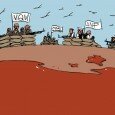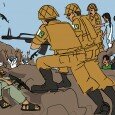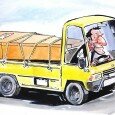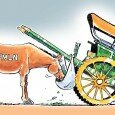Negotiations were a fool’s errand
It is always with a certain somberness that one should point out being right about forecasting the inevitability of war or conflict, but when delays in action become grievous mistakes that cause further bloodshed and loss of life, it is worthwhile to ponder why, when the writing was on the wall, the people who most mattered, who were in positions of authority and power, couldn’t see it.
The March 2014 editorial of this magazine was titled ‘Operation Is The Best Defence’. Our stance and accompanying argument was simple; the entire negotiation process was a diversion, an exercise in buying time for regrouping, reorganizing, even reshuffling their internal hierarchy, on the part of the Tehreek-e-Taliban Pakistan.
Targeted military strikes and drone attacks, for better or worse, had caused major upheavals in the Taliban ranks. The Mehsud tribe was hit hard, there was a leadership vacuum, splinter groups were forming, betrayals and animosities were being fostered, Fazlullah was barely holding together a disparate group of more ruthless, more ambitious militants.
The Taliban needed the peace talks, they needed the time. Our indecisive political leadership gave it to them. An entire year has been wasted. A year with more militant attacks, more lives destroyed, more neighbourhoods leveled, more families ripped apart; and the worst of it? This was all avoidable.
The army sat helpless and idle on painted targets, hideouts, ammunition stores, transportation networks, because the politicians couldn’t agree on the obvious. The military needed the support of the popular mandate, it needed the support of the nation; this was going to be a harrowing, bloodied conflict in harsh conditions against an unrelenting enemy.
The army had the support of the nation but didn’t have the support of weak willed politicians. In any case, that is now red hued water under the bridge. The politicians have finally ceded defeat to their peace talks, the operation has started.
Now the question arises, where do we go from here? The operation will be long and drawn out. We will achieve victory, but the costs will be high, already there are millions of IDPs, they look towards the civilian leadership for help, the respective provincial and federal governments can no longer afford to disappoint.
Neither can they pretend this operation alone will solve all of the country’s extremism and militant problems. There are nominally banned but effectively active groups in Nawaz Sharif’s own province who openly, brazenly support terrorists and murderers. Civil law enforcement, the judicial system, the legislature must all play their part in curbing these groups’ influence. Punjab’s Chief Minister must stop using the police as a personal task force, the leaders have to shape up, things must change.































































































